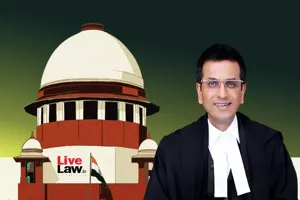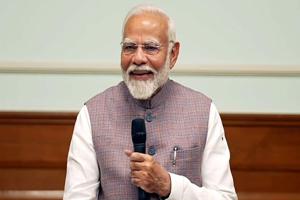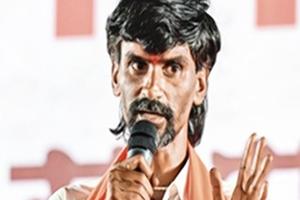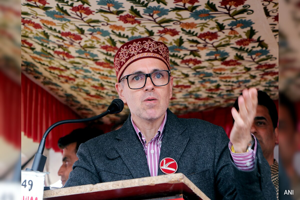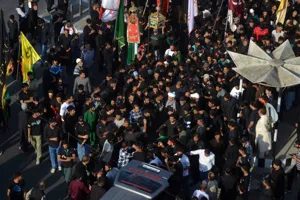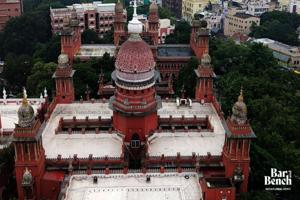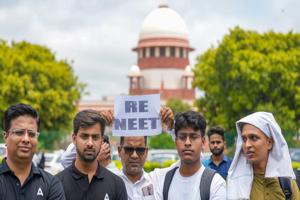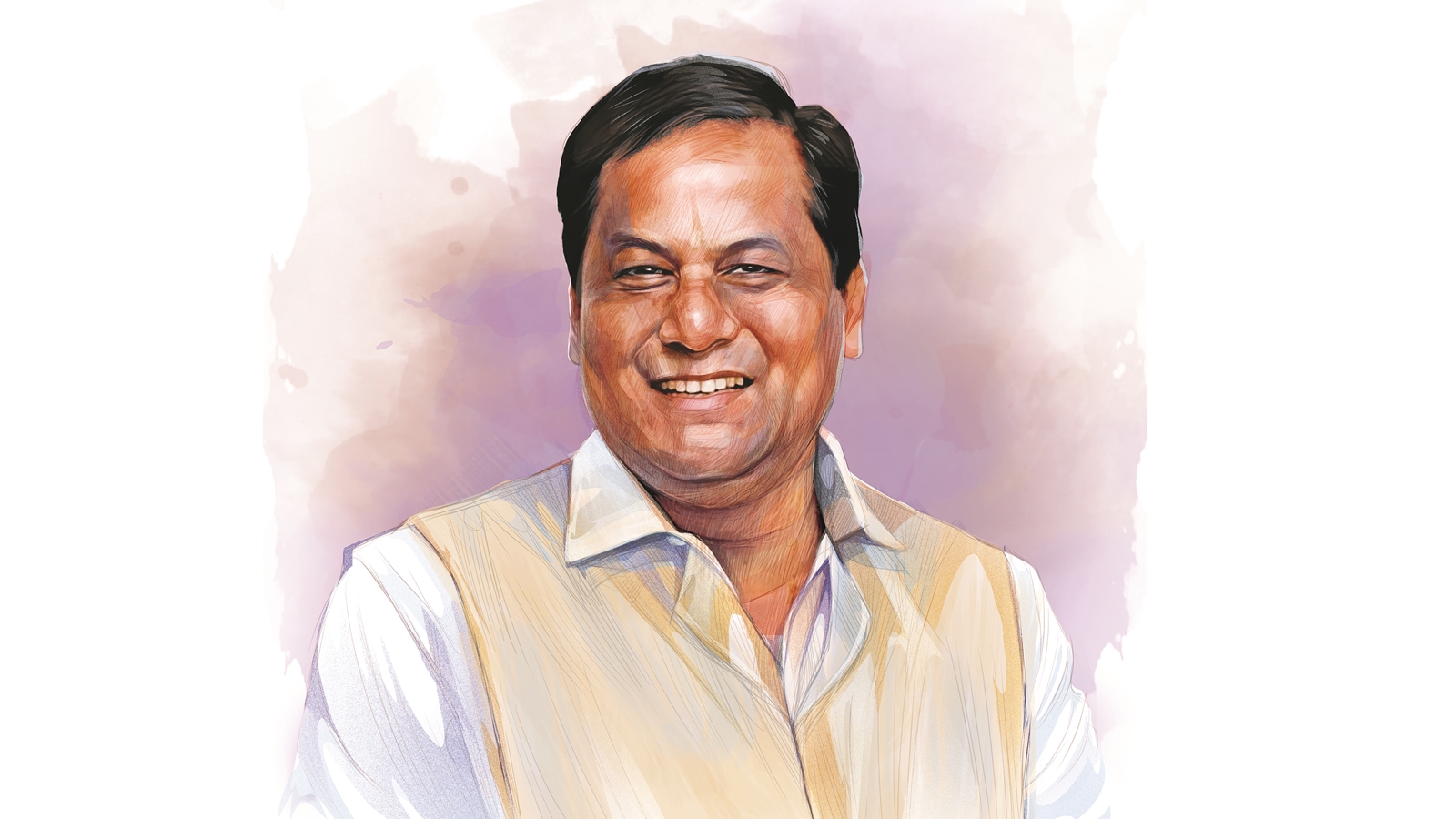
Assam has a very different reaction to CAA and it is feared that it could reflect in the election too. The people of Assam have realised that it (CAA) is not going to impact the identity of the indigenous people of Assam. Student organisations such as the All Assam Students’ Union have filed a petition (against CAA) in the apex court of the country. Also Read | The CAA Rules, unpackedWhat is happening in Manipur is an ethnic conflict between two groups. Do you think this law, being perceived as ‘religion-based discrimination’ will impact the electoral prospects of the BJP?
Sarbananda Sonowal, Union Minister for Ports, Shipping and Waterways, on contesting from Dibrugarh in this Lok Sabha election, implementation of the CAA and how India is making significant strides in the global maritime sector. This session was moderated by Liz Mathew, Deputy Editor, The Indian Express
Liz Mathew: In Dibrugarh, you have replaced Rameswar Teli, Minister of State in the Ministry of Petroleum and Natural Gas of India. He has a very good majority, with more than 60 per cent votes, so why has he been replaced?
This is not my individual decision. It is the decision of the party. I’m a disciplined worker of the party, a karyakarta, and whatever the party decides, I’ll do accordingly. Nothing is related to my individual interests.
Advertisement
Liz Mathew: The government has implemented the Citizenship Amendment Act (CAA) just before the election. Assam has a very different reaction to CAA and it is feared that it could reflect in the election too. What is your take?
The people of Assam have realised that it (CAA) is not going to impact the identity of the indigenous people of Assam. Now, people across the state are concerned about development. They want Assam to grow faster, like other states. That is their expectation. Student organisations such as the All Assam Students’ Union have filed a petition (against CAA) in the apex court of the country. They have laid down their objection through their petition and that’s how they are proceeding democratically.
Also Read | The CAA Rules, unpacked
What is happening in Manipur is an ethnic conflict between two groups. The GoI and Manipur government have handled the situation tactfully as both communities have been taken into confidence by them
Liz Mathew: In Assam, the Muslim community constitutes 40 per cent (of the vote share). In around 11 districts, they are the majority. Do you think this law, being perceived as ‘religion-based discrimination’ will impact the electoral prospects of the BJP? In the last Lok Sabha election, you won nine seats from the state.
Advertisement
People are in the election mood and appreciate the stance taken by the BJP-led government at the Centre and the BJP-led alliance government in Assam. The public belief is that through the government, under the leadership of the Prime Minister, they are getting social security, social justice, economic uplift and a respectable way of living. The BJP and its allies have a bright prospect. Out of 14 (seats), we might cross 12.
Liz Mathew: Does the minority community have confidence in the government or is there fear?
There is no fear because everyone is getting justice under the BJP government. If you analyse at the grassroot level, (you will find) there is no discrimination — every scheme is meant for different categories of people in the state. Everyone is receiving proper benefits. There are schemes meant for women empowerment, youth empowerment, farmers’ empowerment and daily-wage earners. Everyone is benefitting, whether they belong to this religion or that, this community or that community.
Liz Mathew: Will you admit that the Manipur violence was a failure of the administration and the party? The BJP has made deep inroads in the Northeast. Do you think the developments in Manipur have cast some kind of a shadow on the BJP’s prospects in the region?
Advertisement
What is happening in the state of Manipur is an ethnic conflict between two groups. The Centre and the Manipur government have handled the situation tactfully because both communities have been taken into confidence by them. I believe normalcy is coming back. The situation has improved from what it was three months ago. This is, I believe, the right way of proceeding. People have responded well.
The initiatives have been undertaken. The India-Middle East-Europe Corridor is a very viable route which will link Europe and the Middle East (to India). India will benefit highly
Sukrita Baruah: It seems the CAA battle is set in your seat (Dibrugarh) because you’re up against Lurinjyoti Gogoi, who entered politics largely as a product of the last CAA movement. Do you think it could become a relevant issue, particularly in your constituency, if not in other seats of the state?
Congress and its allies are trying to misguide people by giving false figures to terrify them; creating a sense of insecurity. But people are well aware of the facts. I believe Dibrugarh is the most prestigious constituency in the country. During the British rule, Dibrugarh and Tinsukia combined used to pay the highest revenue in the country. Dibrugarh carries that legacy. Even today, there are tea, oil, coal and all kinds of industries there. The revenue generated has contributed to the growth of national and state economies. Dibrugarh has learned people and they understand who is doing dirty politics. They know how the Congress has betrayed the state and compelled the people of Assam and the Northeast to remain underdeveloped because of their misrule.
Sukrita Baruah: In Assam, the NDA is mostly BJP-led because you are contesting in almost every seat except for two seats for the United People’s Party Liberal (UPPL). But in the other Northeastern states, the NDA is still heavily reliant on its regional partners. The BJP is not contesting in Nagaland, Meghalaya or outer Manipur. These cover most of the key tribal areas of the Northeast. Has the BJP still not been able to find its feet independently in these regions?
Advertisement
The BJP and other NDA partners are always together. The decisions are taken in the interest of the country and the region. In the last 10 years, whatever we could perform here is because of the support extended by all parts of the Northeast region and all regional parties. In Assam, we have the AGP (Asom Gana Parishad) and UPPL. All regional parties have been taken on board. This is the principal line, which is absolutely required. I am thankful to the PM because he has given honour to the indigenous people of the region, and the tribal and backward communities.
Vikas Pathak: Over the last month or so, several leaders from other political parties have joined the BJP. The list of your 400-odd candidates includes many of them — be it in Telangana, Andhra Pradesh, Haryana, Punjab or Uttar Pradesh. Some of these party jumpers have also been accused by the BJP in the past. There were income tax raids on CM Ramesh in 2018, when he was in the TDP (Telugu Desam Party). He joined the BJP in 2019. Now, he’s a candidate. AAP (Aam Aadmi Party) leader in Punjab, Sushil Kumar Rinku, who has joined the BJP, was disqualified last year along with other MPs for bad behaviour. If the BJP is an ideological party that thinks it is different, how do you explain this large influx of people from other parties?
The last 10 years of the BJP-led NDA government have been exemplary. PM Narendra Modi’s untiring effort for the speedy growth of the country, while taking all people together, is exemplary. Whoever comes to the BJP has to strictly follow this principle. Everyone knows that the BJP works with honesty. Its main path is to serve the people of the country, not to serve any individual or leaders.
Vikas Pathak: When the CAA was first talked about five years ago, there was a lot of debate but the BJP eventually won the elections. There was concern in Assam that there was a large influx of Bengali-speaking people who might be Muslim or even Hindu. Now, with the CAA, the cut-off date of the Assam Accord has been extended from March 24, 1971 to December 31, 2014, which was bound to raise concerns. How has the BJP been able to secure victories even after that? How have you explained the legitimacy of the decision to the people of Assam?
Advertisement
Being an Assamese, my task is to protect the identity of the people of Assam. I was the Chief Minister of Assam from 2016 to 2021. A commission had been constituted under the leadership of HS Brahma, former Chief Election Commissioner of India. It included experts. Through detailed survey reports, they submitted that most of the indigenous people of Assam have land holdings but not the land documents, constitutional documents, the patta. That’s why they have always been deprived of all other facilities. They always felt insecure and had been demanding the land document but the Congress did nothing.
The BJP government started the survey and brought the document, and accordingly we have started giving land patta. During my five years, more than 3,67,000 families were given this land document. Now there is a scheme called Basundhara. Himanta Biswa Sarma as Chief Minister is continuing this particular scheme. From 2016 to 2024, close to six lakh families have been given the land document.
You are aware of the culture that was originally being practised in the Satras and the Namghars. These were the most sacred places for the people of Assam. Namghar was like a local parliament, local institution of cultural activities and local institution of expression. It was also an institution of the local judiciary because small disputes were disposed of here when senior citizens of that particular village assembled. It was a premier institution of our democracy that was under threat because of encroachment.
Then there are different languages and mother tongues of different indigenous people. There were difficulties continuing the practices of its promotion. Through a scheme called Bhasha Gaurav we could render financial support to all the Sahitya Sabhas.
Advertisement
In the case of CAA, we have been saying that if anybody has any objection, please go to the court of law and file a petition, as I did in case of IMDT [Illegal Migrants (Determination by Tribunals) Act]. That was a discriminatory law. The Congress wanted Assam to be a dumping ground for illegal migrants by way of imposing the IMDT Act, 1983. I filed a petition in the Supreme Court and challenged its validity. The legal battle went on for five years. Ultimately, in 2005, the apex court struck it down.
Sukalp Sharma: There was a lot of talk about the India-Middle East-Europe Corridor, and also the Eastern Maritime Corridor between Vladivostok and India. Considering the geopolitical crisis in the Middle East over the past few months and how globally there have been problems with shipping and trade routes, could you give us an update on these projects?
The initiatives have been undertaken. The India-Middle East-Europe Corridor is a very viable route which will link Europe and the Middle East (to India). India will benefit highly from this particular scheme. It will be economically viable and India will have access to the global market, the entire European market. A golden opportunity will be provided to Indian business houses, exports and imports, and all other stakeholders, whoever is interested in the maritime track.
On Vladivostok, we had a very successful workshop between Russia and India in Chennai. That helped sort out many other problems. We have identified the potential cargo from Russia and potential cargo from India. Indian and Russian counterparts could create a very good ecosystem for business growth, both ways. Vladivostok to Chennai would be far shorter than St Petersburg to Mumbai. It (the latter) takes 40 days, but here it will be reduced by 16 days. So, it would be very economical and there will be seamless movement of our cargo vessels from India to Russia. The business relationship between the two nations will be stronger in many ways.
Advertisement
Sukalp Sharma: The share of private sector ports in the overall shipping cargo volumes in India has been growing, which more or less has come at the expense of the share of the Central government-owned major ports. Now, the Tariff Authority For Major Ports (TAMP) is out. Is there any additional effort coming from your ministry and the Central government to increase the share and efficiencies at major ports? Also, what is the ideal balance between the private sector and the public sector when it comes to cargo handling at ports?
The Jawaharlal Nehru Port Authority (JNPA) fully became the landlord port in the country first. So, like public-private partnership (PPP), this particular policy should be made productive. An ecosystem should be created to encourage all stakeholders. If the Government of India in the last 10 years failed to create the ecosystem and better facilities in port operation, then private players would not have been attracted. There has been modernisation, mechanisation and digitisation in the ports, and also port-led digitisation, port-led connectivity enhancement, coastal community development, coastal shipping, inland water ways. These are the parameters where we have put a lot of effort. As a result, every major port in India can compete with the best ports in the world. We are now attracting big shipping lines. They are willing to invest in such a manner that the partnership is viable. Ultimately, India could become one of the leading maritime nations in the world. At the Global Maritime India Summit held in Mumbai, we signed 360 MOUs and brought Rs 10 lakh crore investment commitment.
Liz Mathew: As a Minister, you have interacted a lot with the southern states in the past few years. What does the BJP lack in the South? Why has it not seen as much success?
I was there for many months and interacted with the common people as well. They are very happy. They have tremendous faith in the PM’s leadership and feel that if the BJP is in power, they will get more benefits in the near future. In this Lok Sabha election, a large number of states are going to support us and we are bringing many more MPs from those two states (Telangana and Tamil Nadu).
©All Rights Reserved.

